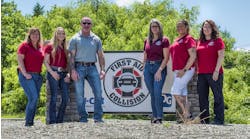When Tommy Hufnagel, owner of Tommy’s Nob Hill Auto Body of Albuquerque, N.M., notices previous body work on a customer’s car that was not professionally done, he does more than just point it out to the customer. If the original work was done within the previous four years—and therefore is still within the statute of limitations—he goes a step further. He offers to compare the work that was done with the paperwork from the previous body shop and the customer’s insurance company to determine whether the customer might be entitled to payment for work that wasn’t completed in the same manner that it was billed. When appropriate, he will provide an estimate of the cost to do a job properly and, if needed, he will provide the customer with names of attorneys that could handle a complaint on the customer’s behalf.
Shop name: Tommy’s Nob Hill Auto Body
Location: Albuquerque, N.M.
Size: 10,000 sq. ft.
Volume: 60 repairs per month
Revenue: More than $1 million annually
Employees: 9
“There are a lot of good shops, but unfortunately, some shops are doing business the old-fashioned way,” says Hufnagel. “They think if they make the paint shiny, the customer won’t notice whether the repair work was done properly.”Forensic inspections, which Hufnagel does at no charge to the customer, have earned him a reputation for consumer advocacy in Albuquerque. “I’ve had other body shops send people to me,” Hufnagel says. “If someone comes in and says, ‘I want you to checkout some bad work that was done on my car,’ they’ll send the person to me.”
Hufnagel says his shop doesn’t get a lot of immediate repair work as a result of his efforts. In one case, for example, Hufnagel helped a customer win a $12,000 claim against his insurance company for work that wasn’t done properly. But the insurance company ended up totaling the car and selling it back to the shop that originally did the repair. The shop preferred that alternative to paying the insurance company $12,000. But when Hufnagel helps out a consumer, that person often comes to him for future repair jobs. “Our repeat business rate is very high,” Hufnagel says.
Hufnagel’s attitude toward how collision work should be done is a lot different from what he was originally taught, he says. When he started in the business, he got his initial training from an industry veteran who believed the goal was to “make as much money out of everyone who comes through the door as possible,” Hufnagel notes, adding that many shops followed that philosophy at that time. Today, “I’m the opposite,” he says. “I don’t sell anyone anything they don’t need.”
During the 1980s, Hufnagel worked in a shop in California that he owned with his father. At the time, many shops took the attitude that, because insurance companies didn’t pay what was required to do a job properly, “You didn’t fix a job according to the estimate,” he recalls.
That attitude carried over into the late 1980s, when Hufnagel moved to Albuquerque and, after working for someone else for a year, opened Tommy’s Nob Hill Auto Body in its initial 2,000-sq.-ft. location in 1987. At that time, Hufnagel worked on all the cars himself with just one helper, but within a year, business had grown to the point where he needed to move into a larger facility.
“When I opened my business, my financial advisor told me I didn’t have enough capital,” Hufnagel says, adding that he had $15,000 in cash, which ran out after four months. “But at the fourth month, I started making money.” Hufnagel attributes his early success to referrals that resulted from doing good work. “I made friends with several mechanical shops in town,” says Hufnagel, adding that the owner of one of those shops had particularly loyal customers. “If he said, ‘Take your car to Tommy,’ they wouldn’t take it anywhere else.”
Hufnagel’s consumer advocacy began about 10 years ago. “What changed my life a whole lot was I-CAR,” says Hufnagel. As technicians began to go through the I-CAR training programs established in the early 1990s, they also began to rethink their repair practices, he says. “Insurance companies also got educated and started paying for things they hadn’t paid for before,” says Hufnagel. “They paid for operations that were needed.” As that industry shift occurred, Hufnagel says, “I reflected back on what I used to do and didn’t like it.”
Unfortunately, Hufnagel sees insurance companies slipping back into old habits, sometimes not paying for work to be done in accordance with proper procedures. A year ago, Hufnagel made the decision to no longer participate in a direct repair program that brought his company a substantial percentage of its business. That insurance company, he says, “had practices I couldn’t deal with.”
For example, the insurance company sometimes forced shops to melt in sail panels as part of the refinishing process, rather than refinishing across the roof and down the other side. Although repairs completed in that manner look fine initially, after a couple of years, a visible line often appears where the refinishing process stopped. “The insurance companies play the odds,” figuring that many people will sell their car within two years, Hufnagel says.
Although Hufnagel expected to lose a lot of work as a result of the break with his insurance company, the drop wasn’t as great as he expected. “The nice thing is that customers and many agents still like me,” he says. “We still kept a lot of work without concessions. My profit went up 5 percent and my volume didn’t drop much.”
The change also was easy for Hufnagel to accept because he realized he doesn’t want to own a really big shop. He’s at a point in his life, he says, when he doesn’t want to work long hours—and because he likes being a hands-on manager, he doesn’t like to delegate important management tasks to others. He would actually like to sell his current 10,000-sq.-ft. shop, which has more room than is needed, and move to a smaller 7,000-sq.-ft. space in a better location that the current owner is holding for him.
A few years ago, Hufnagel was concerned that he might not be able to survive as a small shop as the industry became increasingly consolidated. “But then I realized we weren’t like other shops,” he says. “We’ll always have a niche market anyway.”
Perhaps not surprisingly, Hufnagel says, some insurance companies try to steer business away from Tommy’s Nob Hill Auto Body, but that doesn’t phase him. He continues to advise shops that live in fear of insurance companies to challenge insurers if they refuse to pay for work that needs doing. Only through such challenges can shops get insurance companies to better understand quality repairs and change their minds about the types of work they will cover, he says.




